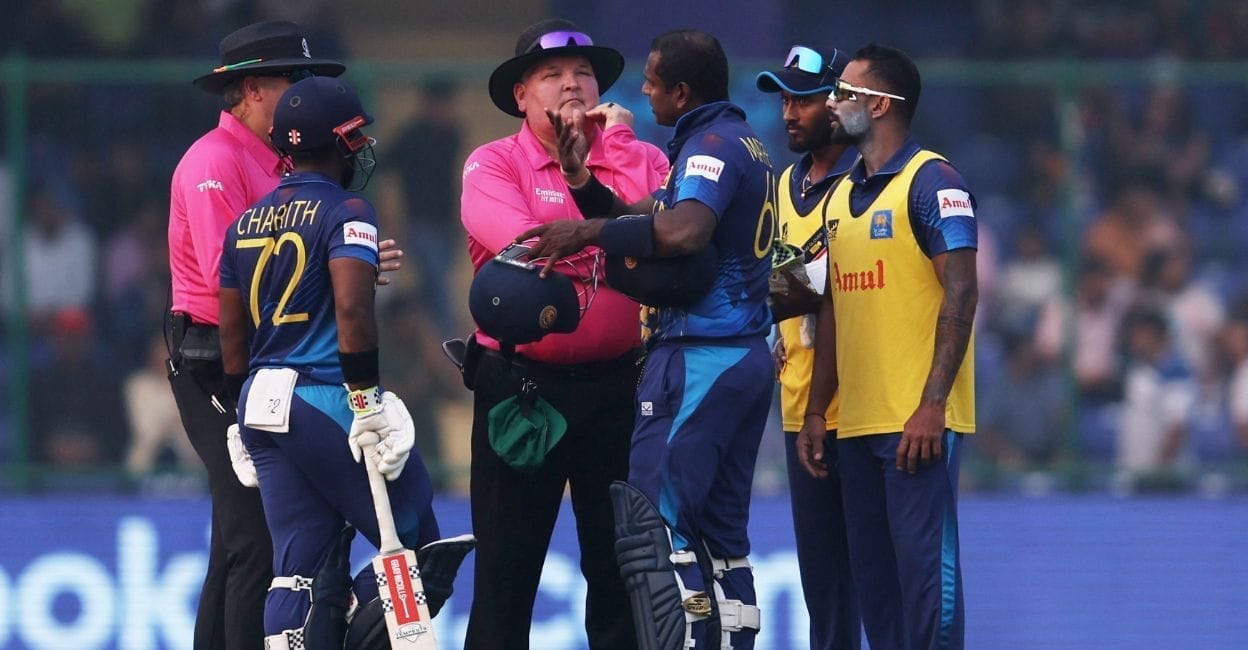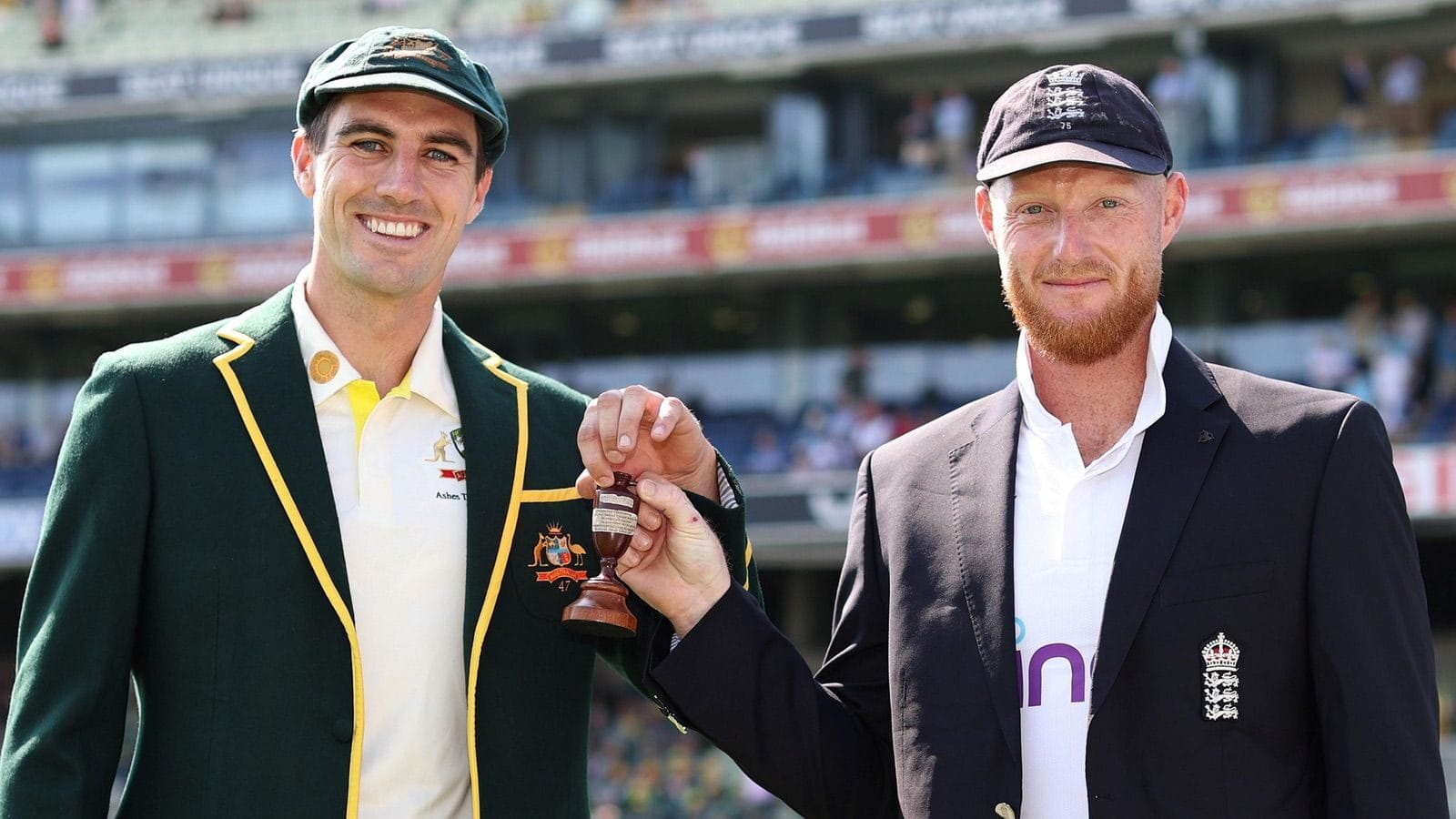The game between Sri Lanka and Bangladesh in Delhi, the 38th game of the tournament, was not without interest to the impartial observer – particularly if he or she were English – because of the need for teams to finish in the top eight in order to qualify automatically for the ICC Champions Trophy to be held in Pakistan in 2025.
In fact, the game gained a fame, or notoriety of indisputable rarity when the veteran Sri Lankan all-rounder Angelo Mathews became the first batter to be “timed out” in the history of international cricket.
To put this extraordinary incident in context, Sri Lanka, who batted first, were in some danger when Mathews was out. His dismissal appeared to galvanise his teammates and they finished with a more or less competitive total of 279. Bangladesh appeared to be coasting to victory, then stumbled, eventually winning by three wickets.
Although Mathews was not in the original squad he is one of Sri Lanka’s best and most experienced players. Had he batted, it is quite likely – certainly not inconceivable – that he would have made a difference to the result.
The playing conditions for the tournament supersede the Laws and the relevant provision states that a batter must “be ready to receive the next ball within 2 minutes of the dismissal” of the previous batter.
Those few words are at the heart of the explosive row surrounding the dismissal.
Mathews walked out in what appeared to be a perfectly normal way and took up his position in front of the stumps. He immediately started fiddling with his helmet strap, and bent down as though to pick something up. He then moved away, taking off his helmet and waving to the dressing room, apparently summoning the twelfth man to bring a replacement helmet. At this point it appears that the Bangladesh captain, the left-arm spinning all-rounder Shakib-al-Hasan, another highly experienced player, who was bowling at the time, approached the umpires and appealed. Discussion became increasingly heated as Mathews joined in and he was given his marching orders.
Was Mathews ready to face the next ball within two minutes of the dismissal of his predecessor? That is not an easy question to answer. There was a strange and unhelpful interview with the reserve umpire, Adrian Holdstock, during the innings break, and he said that it was the TV umpire’s job to monitor the position from the moment of dismissal, and that Mathews had not reached the crease within the required two minutes. This apparently was the position relayed to the on-field umpires. Nobody else seems to think this was the case; it seems to have been accepted that Mathews reached the crease with five seconds to spare.
Does that mean he was ready to receive the next ball? There are arguments either way, which is why the situation is so contentious.
Before examining that issue, it is worth looking at the characters involved. Ben Gardner, of the Wisden podcast, has said that if someone was scripting the incident they could not have cast three more perfect characters.
I should declare an interest in that I am a fan of Sri Lanka cricket and I am a fan of Mathews. I think he is a marvellous batter to watch and he has a very good record in all formats. He is a very good cricketer indeed if not quite a great one. He always seems “cool” as one used to say. This can be a problem for a professional sportsman – think of David Gower. But Dave Dave Whatmore, a highly experienced coach who has worked with Mathews at the IPL, has said that he is utterly professional and “never late for anything”.
Shakib is another highly experienced campaigner, very successful in all formats, and one of the best all-rounders of his generation. “Cool” is not an appropriate description. He has been known to kick the stumps down when dissatisfied with a decision and has open spats with senior colleagues; a few years ago he was banned from the game for some sort of association with bookmakers. He appeared to be relishing this on-field controversy.
Mathews and Shakib must have been playing cricket against each other for the best part of twenty years. It was somehow inevitable that Shakib would play a leading role in Bangladesh’s successful run chase and that it would be Mathews – who hasn’t bowled for years before this World Cup – who dismissed him, sending him on his way with a tap on his watch.
Morais Erasmus was the senior on-field umpire. As an official he has literally seen and done it all. He is highly respected by the players and can be relied upon to handle any nonsense firmly. Oddly enough, he was officiating on the last occasion – perhaps the only occasion – when “timed out” was a potential issue in an international match. This was during the Third Test between South Africa and India at Cape Town in 2005-06. India lost two quick second innings wickets and Sachin Tendulkar made his way towards the middle. But the on-field umpires realised that he had spent several minutes off the field the previous day so he was not yet allowed to bat. Next man in, VVS Laxman was, as Wisden put it, literally caught with his pants down, in the toilet. Sourav Ganguly had to go in first, though, he had to change into his whites. There was a delay of seven minutes. On-field umpire Darly Harper made it clear to South African captain Graeme Smith that because of these unusual circumstances, an appeal for “timed out” would not be entertained.
Inevitably the Mathews incident has been compared to the Jonny Bairstow stumping in the Ashes Test at Lord’s earlier this year. The two incidents certainly have at least two things in common: first, neither Bairstow nor Mathews was attempting to gain any advantage; secondly, both were extremely dozy and casual. There is a third point of comparison, namely that, as the years go by, if Alex Carey and Shakib are remembered for anything by the casual cricket follower, it will be for the incident each was involved in. But the differences are that, first, Carey’s action seemed almost instinctive, and that, secondly, Carey was not Australia’s captain.
My own view is that everyone involved in this unhappy incident was at fault. Mathews, who did the post-match press conference for his team, blamed equipment malfunction and a lack of common sense. But if he had had his wits about him he would surely either have faced the next ball without a helmet and called for a replacement then, or immediately explained the situation to the umpires and the opposing captain rather than appearing to take the law into his own hands. Like Bairstow, it clearly never occurred to him that he might be in danger of being given out until it was too late. (He could also have checked his equipment earlier.)
Shakib’s view was that he did not know or care whether what he did was right or wrong; his only interest was in ensuring that the rules were complied with and in winning (they were “at war”). That seems too hard a line. I am sure that not even the most zealous Bangladesh supporter would have criticised him for withdrawing the appeal. Most fair-minded neutrals will have been thinking, is that really how you want to win, to which Shakib would clearly have answered, yes.
But I think the umpires are at least as much to blame. If it is true that they were being fed wrong information by the TV umpire then that in itself is a real problem. Maybe an umpire cannot force a fielding captain to withdraw an appeal. But the position was not at all clear. Erasmus has the clout, one would think, to bring people to their senses before an appeal is made. To be fair to Shakib, he may have been concerned about being penalised (with regard to fielding positions) if his team took too long to bowl their overs but Erasmus could have reassured him on that front.
It is fair to ask, what mischief is this regulation / law aimed at? Presumably it is designed to move the game along, to make sure that things are not held up indefinitely. But play is held up frequently these days for no good reason. Two instances come immediately to mind. Early last summer I was having a look at the livestream of a county game between Sussex and Worcestershire. Steve Smith was playing for Sussex and I wanted to watch him bat. He came in but almost immediately there was a hold up. It was not immediately apparent why. Then it emerged that there was a health and safety issue; Smith’s helmet did not comply with UK standards (note that Smith was a friend and teammate of the late Philip Hughes). Somehow the issue was resolved but it took a while. Then, on the day after the Mathews incident, during Australia’s innings against Afghanistan, Marnus Labushagne kept holding play up because he was apparently bothered by movement behind the bowler’s arm, i.e., several feet above the enormous sight screen (nobody else was concerned).
Of course everyone wants to keep the game moving. Time-wasting, which is sometimes an issue in cricket, was the last thing on Mathews’ mind.
Should the Law be changed? That seems ludicrous. Hopefully, if it ever has to be applied again there will be a more rational approach.





1 comment
Piers Pottinger
A most illuminating piece. I am only sad to see you call a batsman a”batter” which is something I normally associate with fried fish.